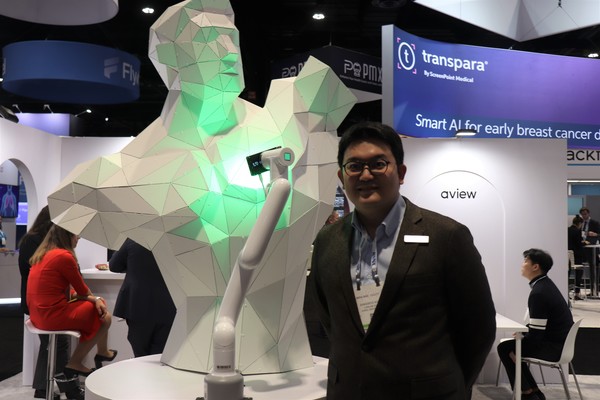CHICAGO, Ill. -- Coreline Soft was one of the Korean AI companies that attracted attention by addressing the unmet needs of radiologists during the Radiological Society of North America (RSNA) 2022 in Chicago, Ill., until Thursday.
The company has regularly participated in RSNA since 2015, introducing upgraded software and products yearly.
To showcase its core 3D visualization technology this year, the company installed a 3D human body sculpture in its booth, allowing visitors to scan locations and learn how the company's software analyzes medical images.
The Korean company also drew interest from global radiologists, as GE Healthcare recently selected it as a participant in Edison Accelerator Program (EAP), which aims to expedite, validate, and scale innovative AI solutions for the health sector.
Among the six companies chosen to participate in the EAP, Coreline Soft was the only one from Asia.
Against this backdrop, Korea Biomedical Review met with Coreline Soft CSO Kang Sang-woo to hear about the company's performance during RSNA 2022 and its future goals.

Question: We are curious about the reactions of visitors to your company. Were there any solutions that visitors showed particular interest in?
Answer: Radiologists and the AI medical device market focused on AI software's performance in RSNA 2021. This year, the focus has shifted to real use cases and how AI systems can be incorporated into medical devices.
Radiologists who visited our booth also asked more real questions about how our AI software can increase efficiency and reduce test time.
Q: Has the company's image or perception improved compared to previous RSNA conventions?
A: Our projects in the EU attracted attention from U.S. radiologists as a large-population screening project is an unfamiliar subject in the country.
Also, radiologists showed interest in our software that can help find various lesions simultaneously with just a single chest computed tomography (CT) scan.
More than half of the visitors who came to our booth made prior appointments with companies and radiologists interested in introducing our software to their medical devices or hospitals.
Q: Many Korean AI medical imaging companies have participated in RSNA 2022. What is Coreline Soft's competitiveness compared to other companies?
A: The biggest fundamental difference is that Coreline Soft is a medical company that uses an AI system. In contrast, most other Korean AI medical imaging companies are AI companies offering medical solutions.
As a medical company, we have continuously worked with hospitals for the past decade. As a result, we have identified the problems doctors face in the hospital ecosystem and created solutions to solve such problems.
For us, AI is just a tool that solves problems.
Coreline Soft believes it is important to put the doctor's needs first as doctors are very sensitive to the slightest change in their workflow, and I think we can provide solutions, allowing doctors not to change their methods.
Also, since we already have a lot of rapport with hospitals and universities, we are engaged in many joint research or development projects, which is our biggest advantage.
Q: Are there any studies utilizing the rapport with hospitals and universities?
A: We are conducting many studies with hospitals and universities.
The biggest study will be the overseas certification projects that the company is conducting with U.S. schools, including the University of California, Los Angeles, and the University of Alabama, for our products that received innovative medical device certification from the Ministry of Food and Drug Safety.
We now obtain FDA certification for our products through joint research with U.S. universities.
Q: I would like to ask about your business perspective. Is there a certain region that the company is focusing on entering?
A: In Europe, we have created a foothold and are working on several projects.
We are now focusing on the North American market.
To this end, we have set up an offshoot in Atlanta and conducted various studies with nearby universities, including Duke University and Wake Forest University.
We also became a participant in GE's EAP this year and had a showcase just before RSNA 2022.
The response was very good, and there was a lot of interest in our products, so we expect the EAP program to help us smoothly advance to North America.
Being a GE partner has great meaning in the industry, as we can now use GE's market connections and other resources.
GE is also interested in Canada right now and sees us as a very powerful partner, as Canada has a similar medical environment to Korea.
Q: Does your company have any special development plans for 2023?
A: We are developing a radiology station and will launch the product in 2023. The platform aims to solve every radiology problem with just one solution.
The solution will address specific needs at the radiology department of each hospital.
Q: Any additional comments?
A: Our core mission is to stay ahead of symptoms, which means we want to emphasize the importance of early diagnosis.
Our ultimate goal is to find and predict all diseases with one screening.
We are now focused on the chest area but are expanding our screening service to the whole body, starting with the abdomen. As a result, the number of lesions we can find using our software has increased from two or three to as many as 18.

